For all the current problems facing Utah’s Wasatch Front — overdevelopment, drought, and a general disregard for traffic laws — it’s a wonderful place to live if you’re a trout angler. Rivers and streams are just minutes from the big cities and towns, and their trout consistently grow close to that 20-inch mark. It’s the sort of fishing that spoils an angler.
It certainly spoiled me.
I moved from the Wasatch Front to the base of the Bighorn Mountains in Wyoming. I traded traffic, scary drivers, horrible winter inversions, and overpriced skiing for the relatively untrammeled landscape of northern Wyoming. The Shoshone River, the Montana section of the Big Horn, and the North Platte in Casper are all within a few hours of my new place. I can ski for $45 a day at the local resort, and I found a house I can actually afford (a rarity in today’s West). The nearest trout stream is just under a half-hour away.
At first glance, it’s the perfect stream. The lower section is all pocket water, tumbling recklessly down one of the prettiest canyons in the West. The upper section is dotted with meadows, deep pools, and hordes of eager brook trout willing to take nearly any fly.
I shouldn’t have left the stream after my first visit feeling underwhelmed. I hate that I felt that way. After years of being spoiled by big trout, though, I turned my nose up at the small fish inhabiting my new home water. Moving to Wyoming was definitely the right career move, but I berated myself just a bit for willingly leaving such excellent fishing back in Utah.
Like I said — I was spoiled. For as often as I rail against the Instagram culture that seems to only celebrate big fish, I’d fallen victim to it without consciously acknowledging the fact.
What I’ve come to re-discover over the last few months, though, is that small fish deserve just as much love as their bigger brethren. While they may not put your drag to the test, small trout present their own set of unique challenges.
Accurate Casting
Small trout generally live in smaller streams, which is the exact water I’m so lucky to have just minutes from my front door. Fish tend to congregate in the tight pockets of calm water, especially now with the flows low at the end of a brutally hot summer. Getting a good drift through those pockets demands excellent casting. Sure, it’s not going to win prizes for distance, but it will force you to become decidedly accurate. Small streams are often crowded with overhanging brush, too, which means you’ll need to keep your flies out of trees if you can’t afford to replace them every trip.
I think it’s easier to get a short cast to land accurately than it is a longer cast, but the mechanics are largely the same. If you’re accurate in close, I reckon you’ll have a good shot at being accurate at distance, too.
Well-timed Hook Sets
Setting the hook is all about timing, and small trout teach you just how important that is. While they’ll often hook themselves in their frenzy to eat anything and everything in their path, it’s easy to set the hook too soon and miss the fish entirely. Or, you end up foul-hooking it and probably killing the poor thing.
While it’s a different timing than what you’re used to with big fish, fishing for small trout reinforces the need to react appropriately when a fish takes your fly. It’s easy to go on autopilot, especially if you frequently fish the same water. Small fish demand constant attention, because you never know just how they’ll take your flies.
Good Drifts
Even though they’re known for largely abandoning caution to eat anything that drifts by, small trout can still tell a good drift from a bad one. Often, the difference between a good day and a great day of catching small fish comes down to the drift. I’ve watched some trout in my new stream — all of five inches long — refuse my dry fly because it had too much drag.
Pretending for Real
As fly fishing legend Gary Borger explains, big fish offer anglers the opportunity to “pretend for real.” In Gary’s words,
Remember the old saw, "practice makes perfect"? Well guess what? If one only practices wrong, one only becomes perfectly wrong. Rather than seeing a small fish as an annoyance, or a waste of good angling time, see them as the perfect opportunity to hone skills, learn from mistakes and practice for the big fish. The big cats, for example, learn to hunt as cubs by going out and leaping on the back of the nearest adult gnu. The mother cats brings small game, and usually injured game, for the cubs to "practice on." They learn to get the big game by developing the necessary skills on small game.
Between good casts, timing the hook set, and getting a decent drift, small trout demand as much from an angler as bigger fish do. But perhaps their best quality is their ability to remind anglers of what’s really important — the experience of going fishing. Catching small trout is often easy, but it’s always fun. It never fails to put a smile on my face. So, even if your local trout stream is full of stunted brook trout and you pass it up for a longer drive to “better” water, may I suggest that you revisit the small fish again. Perhaps they’ll remind you, as they did me, that we’re so unbelievably lucky to have any trout fishing at all, and that we ought to not take it for granted.






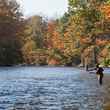
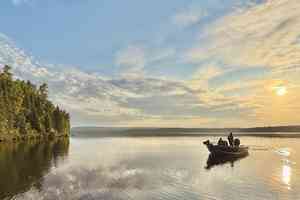




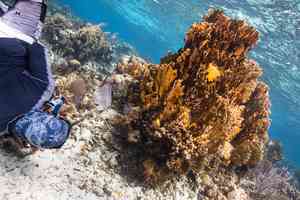

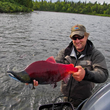




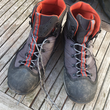




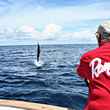

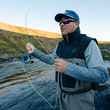


Comments
Glenn Dotter replied on Permalink
Right on the money! Too many folks think if you aren't catching big fish, you aren't much of a fisherman. Small water is uncrowded and a real challenge. You have to be perfect with your casts. You must be stealthy. Those fish might be small, but they are not stupid. They are hungry and once hooked will give you plenty of fight. If you use light tackle like a 2 or 3 weight rod, I prefer fiberglass, and light tippets 6,7, or even 8, you will have a blast and if you dont play that 8" brookie right, you may even find yourself broken off.
Big fish are fun, but small stream fish are a blast!!
MikeK replied on Permalink
Also, more solitude. Everyone else is passing up those little trout too, so you can usually manage to fish alone, or at least out of sight of any other anglers.
Josh Friedman replied on Permalink
Amen!
Pages